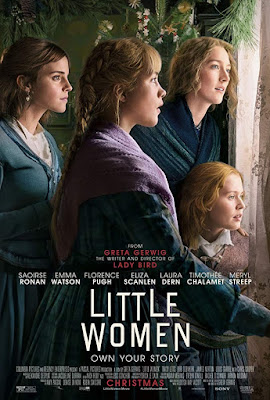What a beautifully crafted film. As the fifth big-screen adaptation of this classic story by Louisa May Alcott, Greta Gerwig's version, which she both wrote and directed, had quite a challenge before it. This story is a touchstone that each generation takes on as a beloved story, time and time again, each instance reflecting evolving values. I've never read the book and only seen the 1994 version with Winona Ryder. Gerwig's version is one that most definitely is representative of the values of 2019.
About 15 minutes into the film my wife leaned over to me and said, "This is already a better version of the story." She's a fan of the book that always disliked the ending. Alcott originally wrote it as a serial, as you may know, and so that ending was not planned from the beginning. Despite that, it was a cultural smash and bestseller, primarily for telling the side of the story that was never reflected in popular writing before, namely the passions and struggles of domestic life of girls and women.
Gerwig's innovation is splitting the telling of the story between the two time periods - childhood and adulthood - jumping back and forth between them while moving forward in each storyline. This has caused some small confusion for some, but just pay attention to the light: the childhood segments are all bathed in a warm, unmistakable golden glow, while the adult era is cold and blue. By using the time periods this way she reveals a key choice that our protagonist, Jo March, makes which normally isn't revealed until halfway through the story. Here, we know what happens and the key question becomes why. Rather than focus on what choice she's going to make and how it affects her marital status, this format asks, by the end of the film, who has she become.
Because it is about four sisters, the story is known for telling the struggle of women in this period of history, and that aspect is certainly prominent in this telling. Adult Amy's speech to Laurie in Paris points out that women are beholden to men, giving a direct description of how ownership of money and even children is prioritized for their husbands. The struggles the March women face is in large part due to not having a man in the house for much for their childhood while the father is off to war. Ever present is the opportunity that marriage plays in their search for meaning and prosperity. For many it is a trade-off between love and security. "Don't tell me marriage isn't an economic proposition," Amy assertively declares.
Deeper than the struggle of women, though, there is a question of seeking dignity that is even more universal. We all seek for meaning in our lives. And one thing I love so much about this telling of the story is that even though the choice that each March woman ends up making is different, they can find dignity and love in their respective situations. There is a wisdom in moving past what you had thought or assumed was what you wanted, especially when that option is taken away from you by someone else. You can learn to live with that and find even deeper and more fulfilling opportunities that you hadn't expected. This plays out in each storyline but is especially at the heart of Jo's.
The craft in filmmaking is strong here and Gerwig puts a powerful team together. Learning about how the Oscar winning Costume Designer used color and clothing to tell the story, assigning color to each sister and the trading of vests between Jo & Laurie, is revealing. The cinematography captures this era beautifully with just enough diversity of settings and angles to go beyond your traditional costume drama cliches. Instead it uses the setting and visuals to add emotional depth to the story. The visual poetry between the two time periods around a setting like the beach or a visual piece like a piano is used all over the film. Every actor adds something unique and tells a different side of this story of dignity.
And again to the writing. I think to bring such life and to rethink a classic in this way should've gotten Gerwig an Adapted Screenplay Oscar, as much as I loved Jojo Rabbit. Some lines you will hear and assume they were one of the modern additions, only to find that they were pulled directly from the book. Other lives you might think you remember reading that in the book but will find it was an addition by Gerwig or an improvisation by an actor.
